A Georgian policeman talks to a young man whose land was abruptly cut off by rows of concertina wire in the village of Akhali-Khurvaleti. He awoke one day to find he was suddenly a resident of Russian-protected South Ossetia.

In October 2013, a few days before the Republic of Georgia's presidential election that would herald the end of the Rose Revolution era led by now former President Mikheil Saakashvili, I headed west from Tbilisi to document a Russian land grab along the fringes of the quasi-independent Republic of South Ossetia. Members of Vladimir Putin's Federal Security Service (FSB)-the successor organization to the Soviet KGB- had been quietly busy hardening the border around this rather obscure Russian proxy statelet that is only 70 kilometers from the Georgian capital Tbilisi.
Officially Moscow is safe guarding the self determination of the Ossetian people, an ethnic group distinct from mainstream Georgians who speak a language related to Farsi but like Georgians and Russians are also Orthodox Christians. To the north is the Republic of North Ossetia which rather than being promoted by Moscow as a sovereign state on the world stage like its southern ethno-linguistic kin, is a constituent republic of the Russian Federation's North Caucasus region.
During the Soviet period when Georgia was one of 15 Soviet Socialist Republics, South Ossetia was carved out as an autonomous region within the Georgian SSR. An official from Georgia's Ministry of Internal Affairs, stated that unlike North Ossetia where the bulk of Ossetians live, he believed South Ossetia to have been an artificial cartographic invention from the Stalin period to reward loyal Ossetian communists whom Stalin portrayed as clients who were useful at keeping Georgian nationalists off balance.
The divisive cartography of the early years of Soviet rule was often imposed to divide and rule the non-Slavic minorities on the USSR's colonial periphery. The unhealed wounds of such secretive map-making continues to roil the post-Soviet world from the Caucasus to Central Asia till today.
The de facto border dividing Georgia and South Ossetia is known as the "Administrative Boundary Line" (ABL). The Georgian government is not entirely clear how the Russian FSB is deciding precisely where-going down to the meter-the ABL lies.
Davit Vanishvili, a villager in Akhali Khurvaleti, describes how his home and land have been subsumed into the Russian encroachment into Georgia proper. Vanishvili has been cut off from family, neighbors and the country where he remains a citizen.
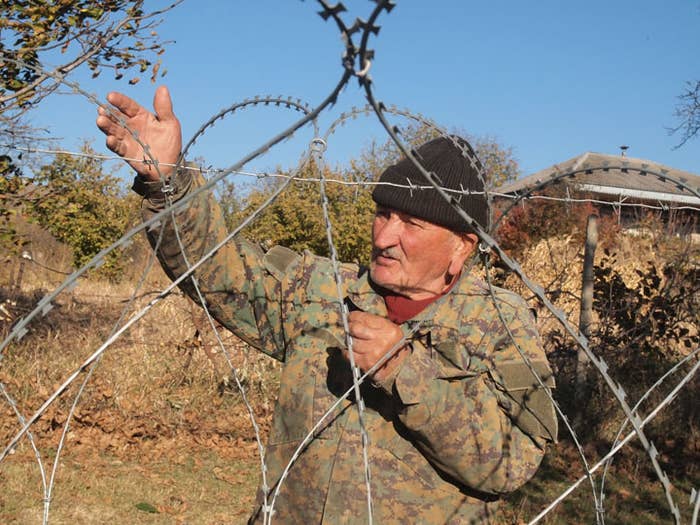
It is thought that Moscow is making judgments or justifications based off of Soviet era maps dating back to the early 1920s when Georgia was absorbed into the nascent Soviet Union after a brief few years of independence between the collapse of imperial czarist Russia and the formation of the USSR. The Georgian government terms this opaque, entirely unilateral process "borderisation." The current incarnation of South Ossetia began to take shape following a conflict that erupted in the wake of the Soviet dissolution in the early 1990s when civil wars broke out in several former Soviet republics nearly simultaneously.
Georgia's road signs reflect the sovereign ideal more than the geopolitical realities on the ground. As if it were still an entirely unified state, this sign points to Sukhumi, the capital of Georgia's other Russian-supported breakaway region of Abkhazia.
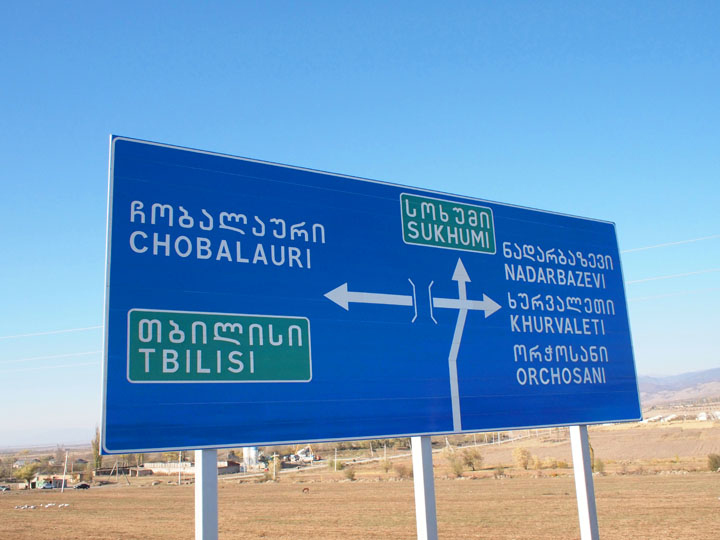
A Georgian police commander stands in the cemetery of Zemo Nikozi, the last Georgian-contolled area before Tskhinvali, the capital of the Republic of South Ossetia.
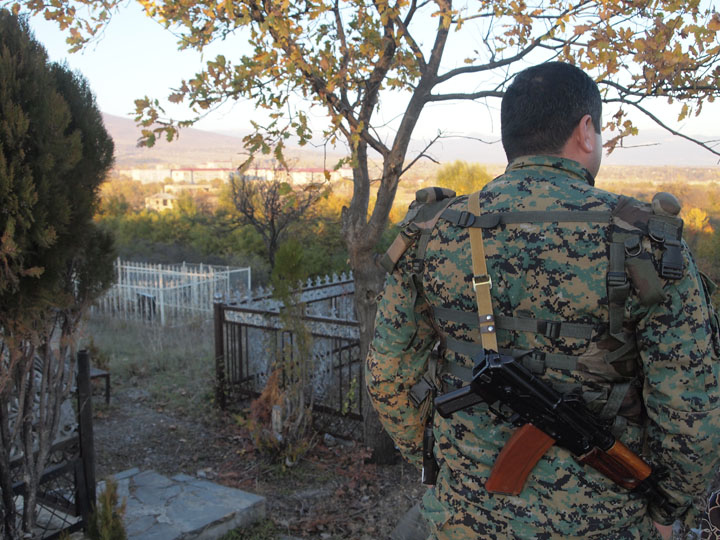
Many of these conflicts are not as intimately known in the West as they could be in comparison of the violent breakup of Yugoslavia within Europe itself which seemed all consuming in terms of both media and diplomacy at that time.
The conflicts in South Ossetia and Abkhazia on Georgia's Black Sea coast were termed "frozen conflicts" because they existed in limbo since the early 1990s with virtually no diplomatic resolution to speak of. In the summer of 2008, things heated up quickly when the Saakashvili government launched an assault of Tskhinvali in a botched effort to retake all or part of South Ossetia. When Russian tanks were rushing around Gori, Stalin's birthplace in central Georgia on the highway to Tbilisi, it was clear that Georgia had made a military miscalculation from perhaps which it might never recover.
Viewing Tskhinvali, the Russian-fostered capital of the breakaway Republic of South Ossetia, from behind Georgian lines. The recent Russian partition of Georgia, which has gone largely unnoticed by the outside world, is somewhat evocative of the Cold War.
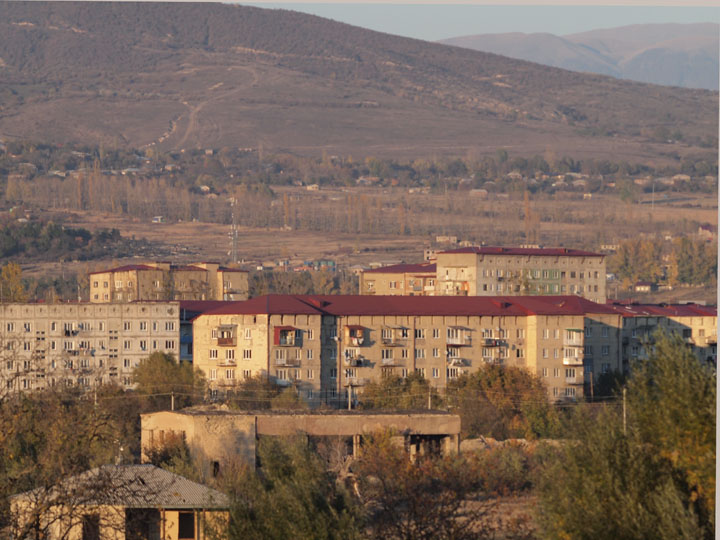
In the aftermath of the disastrous war in August 2008 which effectively solidified South Ossetia and Abkhazia as adjuncts of Moscow's security apparatus, the diplomatic buffer between a weakened Georgia and a resurgent Russia is the unarmed European Union Monitoring Mission (EUMM) which notates border incidents and facilitates talks between the Russian-backed Ossetians and the Georgian government. But while the EUMM continues to monitor Russian actions, it is powerless to stop them.
Under the guise of state-building, the Russians have been busily building military bases close to the ABL in South Ossetia in clear violation of the 6-point peace agreement brokered by then French President Nicholas Sarkozy. The EU sponsored peace plan required that "Russian armed forces to withdraw to the positions held before hostilities began in South Ossetia." In the village of Ditsi, Georgian security forces pointed to a new glowing, sizable Russian military installation being built in the foothills that was clearly visible. In other words, it was not a Russian military position prior to August 7 2008 when hostilities broke out.
A Georgian policeman at the gate the Russians built dividing the village of Ditsi. The locked gate seems to imply that one day there will be an open yet formal border crossing here between South Ossetia & Georgia-an implication Georgia refuses to accept.
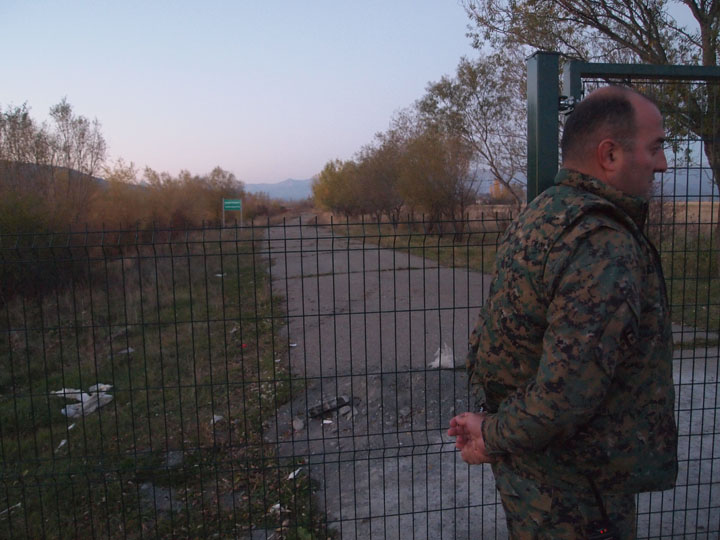
What's significant is that the Russian side is not merely consolidating its control over South Ossetia as it has existed since the war in the 1990s, but it is aggressively folding in patches of indisputably Georgian land thereby enlarging South Ossetia well beyond its commonly agreed upon Soviet boundaries.
Tactics rattling villagers include rolling bundles of razor wire through their private property and enveloping irrigation canals crucial to the local agricultural economy. Residents inside South Ossetia are using the Russian ruble as their currency and Georgians like Mr. Vanishvili are being told they must give up their Georgian citizenship and apply for Russian passports even though South Ossetia is not part of the Russian Federation.
A Georgian policeman points to South Ossetia which many Georgians refer to as an "occupied territory." These men told me they would like much more support from Washington in resolving their dispute with the Ossetians and Putin's Russia.
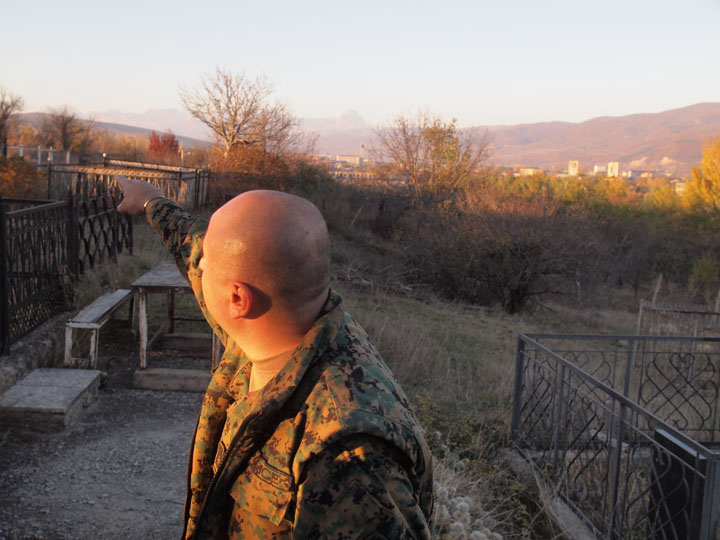
The ABL was once a relatively porous border with local Georgians and Ossetians able to travel back and forth and trade with one another. When the Russian fence building project began to take shape in earnest in the spring of 2011, it was to end all of that. Pastoralists who cross as yet un-demarcated parts of the ABL are subject to arrest by Ossetian militiamen or the FSB who have been setting up monitoring technology to catch transgressors.
Crucially this project is dividing families. Many of the people in this area are of mixed Georgian and Ossetian blood including some of the policemen patrolling the ABL who still have family in Tskhinvali that they can no longer visit.
A Georgian police Toyota HiLux patrols the ABL at dusk.
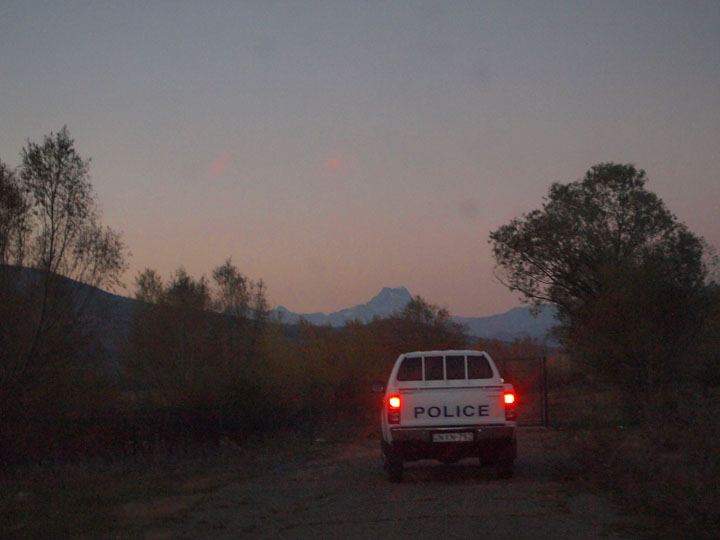
And this is all being done as world media descends on very nearby Sochi for the 2014 Winter Olympic Games. While within Georgia there has been a debate about whether Georgian Olympic athletes should boycott the games altogether, the Putin regime has made provocative moves such as having a Russian pilot who bombed Georgia in 2008 carry the Olympic torch and recently inviting South Ossetian President Leonid Tibilov to President Putin's reception for world leaders at the opening ceremony.
While the global public watches the world's premier winter sports athletes compete for the gold, several hundred kilometers away a microcosmic iron curtain is silently being erected.

